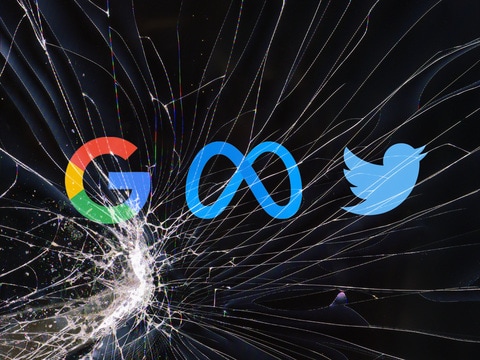Google and Meta’s US ad revenues have slowed thanks to Apple’s privacy crackdown and marketers turning to new modes of advertising such as with streaming services. Meanwhile, Meta faces more GDPR-related fines and Twitter plans to reinstate political advertising.
- Google and Meta’s combined US digital-ad market share is expected to continue dropping for years to come.
- Shopify allied with Google and Meta on a new targeted marketing tool for retailers.
- The Global X Social Media Index ETF is down 37.8% year-over-year.
For the first time in almost a decade, the two biggest players in internet advertising are no longer pulling in the bulk of US digital ad spend. In 2022, Google owner Alphabet [GOOG], and Facebook parent Meta Platforms [META] were responsible for a combined 48.4% of US digital ad spending, and according to Insider Intelligence, this figure will drop to 44.9% in 2023.
While their ad businesses are still growing, it is at a slower rate than the wider US digital advertising market, the data indicates.
Brands now have access to more advertising alternatives, which are eating into the ad revenues of the online heavyweights, according to insider forecasting analyst Zachary Goldner. Amazon [AMZN] and Tiktok are among those snapping up market share in the online advertising industry, along with other streaming services that are catching on.
Shopify tries to bridge data gap
Apple [AAPL]’s introduction of a requirement for app developers to request iPhone users’ permission to track their use between apps, which 75% across the board have opted out of as of April 2022 according to research from Adjust, has disrupted the industry that has historically heavily relied on this data to target users with personalised ads. The privacy crackdown set the industry back by billions last year. Amazon however stands at an advantage over competitors as its ad targeting relies on “first party” data, which bypasses Apple’s “third party” data rule.
Marketers have complained that advertising on Facebook and Instagram has become decreasingly cost-effective without the ability to target ads accurately.
So far there is no direct alternative. However, ecommerce platform Shopify [SHOP] teamed up with Meta and Google in 2022 to attempt to fill this marketing data gap by launching its Audiences marketing tool. It lets retailers combine and upload their customer data to Meta and Google’s advertising platforms, then targets customers based on similar items they purchased.
Digital safety and privacy concerns
The tech giants are also coming under increased pressure from other angles.
New laws coming into force in the EU and UK demand internet companies be more stringent about tackling illegal content on their platforms. In response, Google’s research and development unit Jigsaw and UN-backed initiative Tech Against Terrorism are developing a free moderation tool to crack down on terrorist material shared online.
Meta, meanwhile, has been slapped with yet another privacy-related fine by the EU. The tech giant was fined €210m for Facebook and €180m for Instagram over GDPR complaints concerning its personalised ads.
Twitter, however, has gone in an interesting direction. On Tuesday, Twitter announced plans to relax its policy for cause-based and political ads in the US, including those with calls for action, awareness and education related to civic engagement, economic growth, environmental stewardship and social-equity causes. Under the leadership of Jack Dorsey, Twitter had previously prohibited political advertising.
According to Pathmatics, as of 18 December and following Elon Musk’s takeover and controversial policy changes, 70% of the Twitter’s top 100 ad spenders have suspended advertising on the platform.
Funds in focus: Global X Social Media Index ETF, Global X E-commerce ETF
The Global X Social Media Index ETF [SOCL] provides exposure to some of the largest global social media companies. The fund’s second largest holding is Meta, with a 9.05% weighting, and has a 4.11% holding in Alphabet. The ETF was up 6.8% in the last month, and down 37.8% year-over-year.
The Global X E-commerce ETF [EBIZ] includes a 4.47% holding of Shopify Class A shares. The fund was down 1.3% in the last month, and declined 36.2% year-over-year.
Meta and Alphabet's shares are down 60.7% and 35.6% over the past 52 weeks. Shopify, meanwhile, is down 68% over the same period. According to MarketBeat, the consensus recommendations for Meta and Alphabet are both ‘moderate buy’, while analysts recommend to ‘hold’ Shopify.
Disclaimer Past performance is not a reliable indicator of future results.
CMC Markets is an execution-only service provider. The material (whether or not it states any opinions) is for general information purposes only, and does not take into account your personal circumstances or objectives. Nothing in this material is (or should be considered to be) financial, investment or other advice on which reliance should be placed. No opinion given in the material constitutes a recommendation by CMC Markets or the author that any particular investment, security, transaction or investment strategy is suitable for any specific person.
The material has not been prepared in accordance with legal requirements designed to promote the independence of investment research. Although we are not specifically prevented from dealing before providing this material, we do not seek to take advantage of the material prior to its dissemination.
CMC Markets does not endorse or offer opinion on the trading strategies used by the author. Their trading strategies do not guarantee any return and CMC Markets shall not be held responsible for any loss that you may incur, either directly or indirectly, arising from any investment based on any information contained herein.
*Tax treatment depends on individual circumstances and can change or may differ in a jurisdiction other than the UK.
Continue reading for FREE
- Includes free newsletter updates, unsubscribe anytime. Privacy policy





